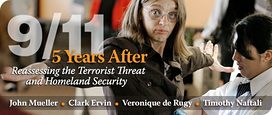This blog has certainly gotten to be fun. Clark says that I misconstrued his God analogy in my first response. Actually what I did was not engage it because I thought it beside the point. But since Clark repeated it, I will engage it now. Essentially Clark’s argument is that it is better to be safe than sorry and he tries to draw the parallel to a person opting to believe in God because this is a decision with no downside and potentially limitless upside. Not believing in God, on the other hand, may have a huge downside.
John, Veronique and I, however, are not debating the existence of the terrorist threat (see why I didn’t want to touch the God analogy!). We are discussing how we assess it and how we ought to deal with it. Clark prefers to dwell in an existential discussion, while we are grappling with the practical consequences of something we know exists.
I don’t know Clark, so I won’t ascribe motives, but his argument is reminiscent (in dulcet tones, though) of the harmful polemics of the Cold War. “Don’t trust X because he won’t do enough to protect your child.” “X doesn’t believe the Soviets want world domination. That is naïve. Why should we as Americans entrust our security to that person?” Both political parties tried to outbid each other in the 1950s on national security terms and the results were the Bomber and Missile Gaps, periods when we overbuilt our national security state to face what turned out to be a much more manageable threat.
Next week I have a new book coming out on the 50s and 60s called Khrushchev’s Cold War (with Aleksandr Fursenko) that uses Presidium/Politburo and KGB records to reconstruct what our adversary was thinking and doing in that period and how our government generally misunderstood what was going on. The Soviets were bad and Khrushchev was belligerent, but unless you were a freedom fighter in Hungary or Poland, they were a paper tiger. They knew it and used propaganda to scare us and we fell for it. The U.S. Air Force argued that even if there was no evidence of a large Soviet missile force, because we know their intentions, we must assume they have the largest missile force a dictatorship could build. So, the Air Force believed the Soviets had 500 InterContinental Ballistic Missiles [ICBMs], when they had about 40.
In the Cold War we had an economy robust enough to allow us to absorb the strategic errors of our leaders and so far the same holds true today. The housing market sustained our economy while we needlessly drained billions into creating a terrorist sanctuary in what was once known as Iraq. Now that the air is coming out of the housing bubble, we may start feeling the pinch.
My point is that it is not good enough for governments to accept the existence of a threat. What matters is how they deal with it. The Bush administration made a series of questionable strategic decisions about how to use U.S. resources to fight a terrorist gang with international affiliates. I believe that once official documents are opened (and the politicians whose fates are linked to our perception of reality have moved on) we will discover that there have been intelligence successes. There were some under Clinton in 2000, by the way, but outside the U.S. But I think the record will also show that the Bush doctrine of trying to prevent terrorism by remaking the world on the cheap helped to fuel the transformation of the Al Qaeda problem into the wider challenge of multiple gangs owing allegiance to an elusive and now near mythic bin Laden. “Mission Accomplished,” indeed.

